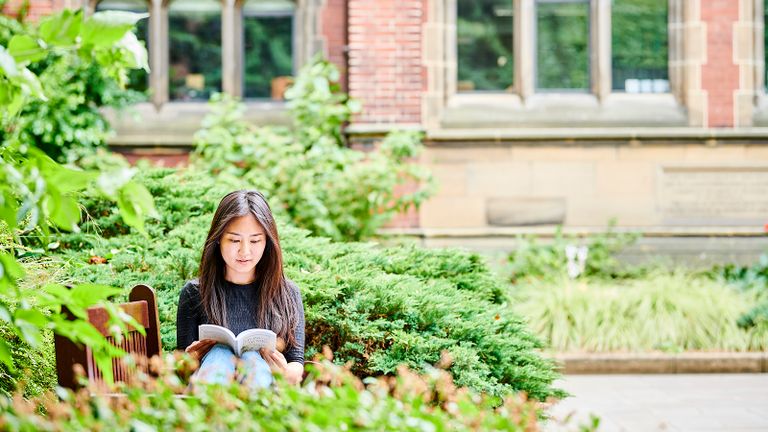Newcastle University
National rank
33
rd=
84.4
%
Firsts / 2:1s
94.5
%
Completion rate
Key stats
123
rd
Teaching quality
116
th=
Student experience
26
th=
Research quality
25
th
Graduate prospects

Performance
| Category | Score | Rank |
|---|---|---|
| Ranking | - | 33= (42) |
| Teaching quality | 68.8 | 123rd |
| Student experience | 66.7 | 116th= |
| Research quality | 53.6 | 26th= |
| Ucas entry points | 145 | 38th= |
| Graduate prospects | 82.3 | 25th |
| Firsts and 2:1s | 84.4 | 27th |
| Completion rate | 94.5 | 13th |
| Student-staff ratio | 14.7 | 33rd= |
| World ranking | - | 122 (134) |
Vital statistics
| Undergraduates |
Full-time 21,331 |
Part-time 46 |
| Postgraduates |
Full-time 5,008 |
Part-time 1,391 |
| Applications/places | 32,400/6,255 | |
| Applications/places ratio | 5.2:1 | |
| Overall offer rate | 78% |
Accommodation
| Places in accommodation | 4,554 | |
| Accommodation costs | £96 - £179 | |
| Catered costs | £136 - £182 | |
| Accommodation contact | https://www.ncl.ac.uk/accommodation/ |
Finance
| UK/EU fees | £9,250 | |
| Fees (placement year) | £1,385 | |
| Fees (overseas year) | £1,385 | |
| Fees (international) | £20,400 - £25,200 | |
| Fees (international, medical) | £36,000 | |
| Finance website | https://www.ncl.ac.uk/undergraduate/fees-funding/ | |
| Graduate salaries | £25,000 |
Sport
| Sport points/rank | 2782.5, 8th | |
| Sport website | www.ncl.ac.uk/sport |
Social inclusion and student mix
| Social Inclusion Ranking | 107 | |
| State schools (non-grammar) admissions | 66% | |
| Grammar school admissions | 10.6% | |
| Independent school admissions | 23.4% | |
| Ethnic minority students (all) | 13.5% | |
| Black achievement gap | -13.5% | |
| White working class males | 4.6% | |
| First generation students | 32.4% | |
| Low participation areas | 8.8% | |
| Working class dropout gap | -4.1% | |
| Mature | 5.3% | |
| EU students | 4.7% | |
| Other overseas students | 12.6% |
Student satisfaction with teaching quality
| Archaeology and forensic science | 86.6% | |
| Dentistry | 85.4% | |
| German | 82.3% | |
| Art and design | 80.1% | |
| Classics and ancient history | 79.7% | |
| English | 79.1% | |
| Food science | 77.8% | |
| Iberian languages | 77.8% | |
| Linguistics | 77.7% | |
| Creative writing | 77.6% | |
| Pharmacology and pharmacy | 75.8% | |
| Sports science | 75.5% | |
| Accounting and finance | 73.1% | |
| Drama, dance and cinematics | 73.1% | |
| Architecture | 72.7% | |
| Medicine | 72.6% | |
| French | 72% | |
| Psychology | 72% | |
| Animal science | 71.3% | |
| Agriculture and forestry | 70.8% | |
| Geography and environmental science | 70.7% | |
| Law | 70.6% | |
| Communication and media studies | 70.4% | |
| Geology | 70.1% | |
| Music | 69.8% | |
| Philosophy | 68.2% | |
| Computer science | 66.9% | |
| Biological sciences | 66.8% | |
| Town and country planning and landscape | 66.8% | |
| Chemical engineering | 66.6% | |
| Subjects allied to medicine | 66.1% | |
| Chemistry | 65.8% | |
| Politics | 65.6% | |
| History | 63.3% | |
| Economics | 62.7% | |
| Business, management and marketing | 62.6% | |
| Physics and astronomy | 62.2% | |
| Mechanical engineering | 61.8% | |
| Civil engineering | 61.7% | |
| Anatomy and physiology | 61.2% | |
| Mathematics | 59.7% | |
| Electrical and electronic engineering | 59.6% | |
| Criminology | 59.4% | |
| Sociology | 59.4% |